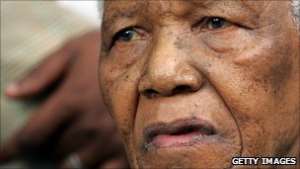
Reflecting on the sad news of Nelson Mandela's death, The African Palliative Care Association's Executive Director, Dr Emmanuel Luyirika, has set out how Mandela has had a lasting impact on health care in South Africa.
Dr Luyirika, a Ugandan who both studies and worked in South Africa said:
“For those of us in health care and specifically palliative care, Mandela has left a legacy that we can build on to ensure that we care for all especially at their point of most need. Let us not weep or mourn but celebrate the African giant who symbolises life, justice and fairness.
As we face the reality that Madiba is dead, it is worth noting the several standards that he stood for. Mandela stood for life in its fullness and embraced peoples' freedoms and rights. From his earlier court appearance in 1964 before an apartheid judge and court room Mandela famously said,
"During my lifetime I have dedicated myself to this struggle of the African people. I have fought against white domination, and I have fought against black domination. I have cherished the ideal of a democratic and free society in which all persons live together in harmony and with equal opportunities. It is an ideal which I hope to live for and to see realized. But my Lord, if needs be, it is an ideal for which I am prepared to die."
The 27 years that followed, Mandela languished in apartheid prisons but with his dignity because he stood for the rights of others and was ready to face jail rather than appease the powers that be. His jail time did not extinguish the hopes of many but instead created further hope among the people of South Africa, the rest of Africa and indeed all people of good will.
When he emerged from prison, Mandela's agenda was clear for he wanted a society where all the perpetrators of apartheid would be forgiven and build a rainbow nation irrespective of colour or creed.
As South Africa negotiated the post-apartheid political set up and development of the new constitution for a free and democratic South Africa with the likes of Cyril Ramaphosa and Roelf Meyer as key agents on both sides, Mandela's ideals extended to human rights. He oversaw the development one of the most liberal and comprehensive constitutions in Africa and indeed the modern world with the rights of people to health entrenched in a very magnanimous bill of rights. On health, the bill of rights enshrined in the South African Constitution chapter 2 section 27 states that:
"1. Everyone has the right to have access to
a. health care services, including reproductive health care;
b. sufficient food and water; and
c. social security, including, if they are unable to support themselves and their dependants, appropriate social assistance.
2. The state must take reasonable legislative and other measures, within its available resources, to achieve the progressive realisation of each of these rights.
3. No one may be refused emergency medical treatment.”
The bill of rights further observes that the “a child's best interests are of paramount importance in every matter concerning the child” and in one of his famous quotes Mandela said: “There can be no keener revelation of a society's soul than the way in which it treats its children.”
Under his leadership and the then Minister of Health Hon Dr Nkosazana- Dlamini Zuma (now President of The African Union Commission) access to medicines and health services was improved for the black majority and supervised the development of one of the first patients' rights charter on the African continent which summarises the rights and responsibilities of patients.
According to this charter the patient has a right to:
A healthy and safe environment
Access to safe healthcare
Emergency care in life-threatening situations
Confidentiality and privacy
Be treated with courtesy and consideration by all staff
Be informed about his/her illness/condition and treatment, so as to be in a position to give informed consent
Exercise choice in healthcare services
Participate in decision-making that affects his/her health
Be referred for a second opinion
Continuity of care
Complain about health services
Be treated by a named healthcare provider
Refuse treatment or information about his/her illness
In addition, Madiba identified with the suffering caused by HIV, poverty and discrimination.
Let us embrace his legacy as we look out for the interests of the most vulnerable in our society and be available to share our lives for their sake.”




 EC’s request to use Ghana Card as sole document for identification would’ve prev...
EC’s request to use Ghana Card as sole document for identification would’ve prev...
 Voter registration: Always check to avoid 2020 election results errors — Kwamena...
Voter registration: Always check to avoid 2020 election results errors — Kwamena...
 Voter registration: Ghana isn't safe; December polls might be 'each one for hims...
Voter registration: Ghana isn't safe; December polls might be 'each one for hims...
 Rapid decline of our country, its democratic institutions worrying, distressing ...
Rapid decline of our country, its democratic institutions worrying, distressing ...
 Religious tolerance: My brothers and sisters are Christians, I cannot say that I...
Religious tolerance: My brothers and sisters are Christians, I cannot say that I...
 CSOs consider civil action against gov't over alleged destruction of protected f...
CSOs consider civil action against gov't over alleged destruction of protected f...
 Domelevo, Kpebu, Gyampo and 83 others petition parliament to probe EOCO’s conduc...
Domelevo, Kpebu, Gyampo and 83 others petition parliament to probe EOCO’s conduc...
 “Take precaution, don’t be in a hurry to go and die” — Author advise drivers, pe...
“Take precaution, don’t be in a hurry to go and die” — Author advise drivers, pe...
 Electoral Commission has been reduced to 'Error Commission' in simple arithmetic...
Electoral Commission has been reduced to 'Error Commission' in simple arithmetic...
 Banking clean-up helped prevent collapse of financial sector – Bawumia
Banking clean-up helped prevent collapse of financial sector – Bawumia
